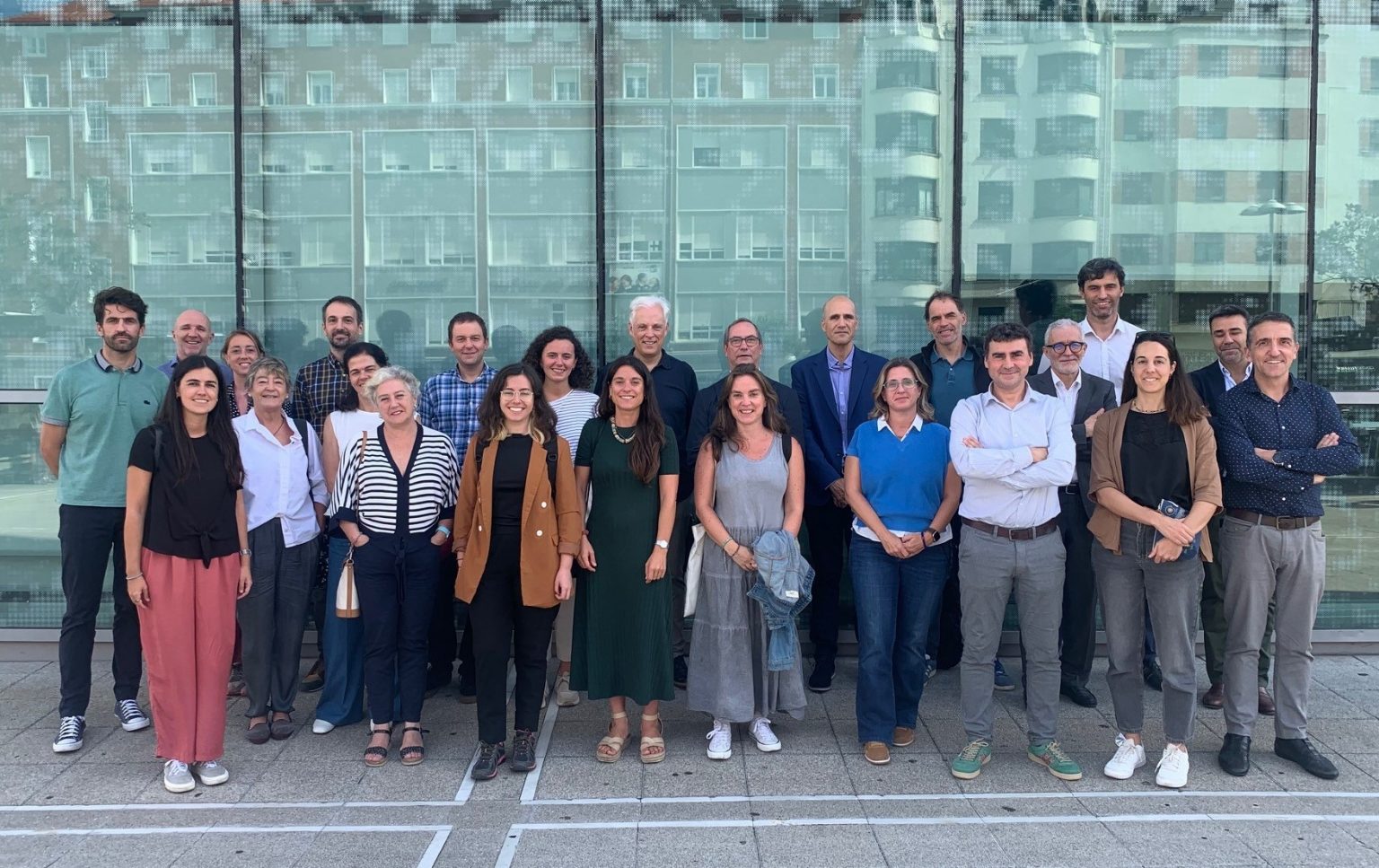Opengela receives the support of the LIFE programme to integrate social, economic and environmental aspects in the regeneration of the neighbourhoods

Representatives of the 14 partner organisations during the project launch meeting.
- The new European project will last three years and provide continuity to the model implemented in the Basque Country, with local offices in rehabilitated neighbourhoods.
- The Opengela model of urban regeneration began in 2019 with two pilot experiences in Otxarkoaga (Bilbao) and Txonta (Eibar) and is being extended to another twenty Basque neighbourhoods.
- The project -funded with 1.5 million Euros- brings together the experience of 14 partners from public and private entities, foundations, clusters and European organisations, led by the Department of Territorial Planning of the Basque Government.
- The Torreurizar neighbourhood in Bilbao will serve as a test bench to experiment with the project’s progress.
In 2019, the Basque Country launched the Opengela model of urban regeneration which set up neighbourhood offices in different municipalities. The success of the initiative has meant that the European Commission has granted funding for a new project – called BIRTUOSS – through the LIFE programme, which will cover the next three years. It will give continuity to the urban regeneration process, which will now be reinforced by the integration of social, economic and environmental aspects.
Opengela was created in 2019 as a project funded through the European Horizon 2020 programme. For almost four years, a management model was developed consisting of a network of one-stop-shop offices that accompany the neighbourhood in the refurbishment of their buildings, providing -in addition to expert advice on technical and financial matters- the necessary proximity and trust during the long process that these actions entail. The starting point was two pilot experiences in the neighbourhoods of Otxarkoaga (Bilbao) and Txonta (Eibar) and the model is currently being extended to around twenty neighbourhoods in the Basque Country.
“The success of the first Opengela project and its replication to other municipalities has been key for the European Commission to renew its confidence in the Basque model of urban regeneration” says Ignacio de la Puerta, director of Territorial Planning and Urban Agenda of the Basque Government and coordinator of the BIRTUOSS project. “In this project that is now starting, we will continue with the approach based on a management model that can be extended to all the neighbourhoods in the Basque Country, through the proximity of offices. But we will provide a more systemic approach, implementing innovative formulas so that, in addition to the intervention in the buildings, other actions are incorporated with the aim of improving the quality of life in the neighbourhoods”.
The project provides a comprehensive vision of urban regeneration, focusing on a management system for the whole of the Basque Country, with five key elements: decarbonisation on a neighbourhood scale (not just for each building), the incorporation of nature-based solutions in the urban environment, the territorial perspective of the deployment of this intervention model with the leadership of public administrations in collaboration with the private sector, based on the consolidation of the model of proximity offices and the application of affordable financing formulas.
14 partners in the European project
The aim is to achieve improvements in the social, economic and environmental aspects of city life. To achieve this, BIRTUOSS will count on the participation of 14 partners from the institutional and private sectors, foundations, clusters and European organisations.
The consortium is led by the Department of Territorial Planning and Urban Agenda of the Basque Government. It also includes the Basque Energy Agency (EVE), Bilbao Municipal Housing (VVMM), the clusters of Environment (Aclima), the Construction Industry (Eraikune) and Knowledge and Technology (GAIA), the CAVIAR research group of the University of the Basque Country (UPV/EHU), EDE Fundazioa, the Cíclica cooperative (specialist in decarbonisation strategies), as well as companies with expertise in financing (GNE Finance), communication (Gabineteseis) and European affairs (Zabala Innovation), and also two European-level bodies such as Fedarene (European Federation of Energy and Environment Agencies and Regions) and Green Building Council Spain (GBCe).
Pilot experience at Torreurizar (Bilbao)
The project will use the Torreurizar neighbourhood in Bilbao as a test bench. The proximity office installed there will experiment with different formulas in the social, economic and environmental fields, with an approach based on co-creation with the neighbourhood and with the aim that in the future they can be applied and scaled up in other cities not only in the Basque Country but also in Spain and Europe.
Torreurizar, located in the Irala neighbourhood of Bilbao, has 25 house numbers and 264 homes whose refurbishment process has already begun. The proximity office that serves the neighbourhood is also up and running.
OPENGELA NEWSLETTER
Receive all news related to Opengela

Co-funded by the European Union. The views and opinions expressed are solely those of the authors and do not necessarily reflect those of the EU or CINEA. Neither the European Union nor the funding authority can be held responsible for them.

